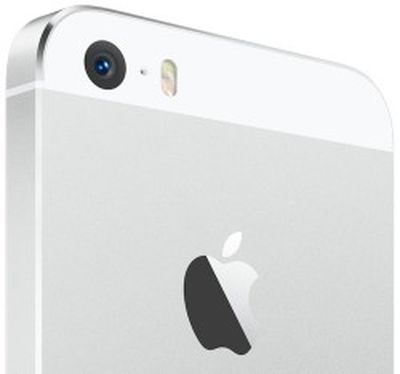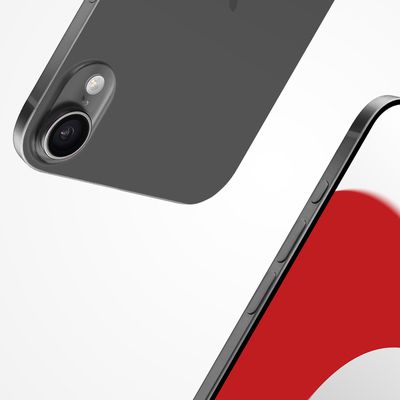iPhone 6 Camera May Feature Electronic Image Stabilization, Bigger Pixel Size
 Apple may be planning to use electronic image stabilization instead of optical image stabilization in the iPhone 6, according to new details shared on Weibo [Google Translate] by ESM China analyst Sun Chang Xu (via GforGames). Xu suggests that the iPhone 6's camera will also boast a larger pixel size of 1.75 um compared to the 1.5 um pixel size of the iPhone 5s' camera, which would result in a higher picture quality as more light can be taken in.
Apple may be planning to use electronic image stabilization instead of optical image stabilization in the iPhone 6, according to new details shared on Weibo [Google Translate] by ESM China analyst Sun Chang Xu (via GforGames). Xu suggests that the iPhone 6's camera will also boast a larger pixel size of 1.75 um compared to the 1.5 um pixel size of the iPhone 5s' camera, which would result in a higher picture quality as more light can be taken in.
While previous reports have indicated that Apple is looking to integrate optical image stabilization into the iPhone 6, adding an electronic image stabilization system would allow for the device to have a slimmer camera that does not protrude out of its body. To this point, a number of alleged iPhone 6 images, including renders posted by Japanese magazine MacFan last month, have depicted the iPhone 6 with a protruding camera.
Xu also previously reported on her Weibo account that the iPhone 6 will add pressure, temperature, and humidity sensors, and that the iWatch will utilize optical sensors to measure heart rate and oxygen levels.
Apple is expected to launch the iPhone 6 this fall in two different sizes of 4.7-inches and 5.5-inches. The smaller 4.7-inch version of the iPhone 6 will likely ship first, while the larger 5.5-inch version is estimated to ship later due to challenges with the device's display technology and battery life.
In addition to a larger display and an improved camera, both models of the iPhone 6 are expected to include a thinner, bezel-free design, faster A8 processor, and Touch ID fingerprint sensor. The device will also likely debut with Apple's iOS 8 mobile operating system, which will feature improvements to Maps, Siri, and iCloud in addition to a new "Healthbook" app. Apple is also said to be negotiating with carriers to increase the price of the iPhone 6 by $100.
Popular Stories
While the so-called "iPhone 17 Air" is not expected to launch until September, there are already plenty of rumors about the "ultra-thin" device.
Overall, the "iPhone 17 Air" is shaping up to be a mixed bag. Due to its thinness, the device is expected to have some limited specifications compared to the iPhone 17 Pro models, including only a single rear camera, only a single speaker, no SIM...
Apple today adjusted estimated trade-in values for select iPhone, iPad, Mac, and Apple Watch models in the U.S., according to its website.
Some values increased, while others decreased. The changes were not too significant, with most values rising or dropping by $5 to $50.
We have outlined some examples below:
Device
New Value
Old Value
iPhone 15 Pro Max
Up to $630
U ...
Apple provided the third beta of iOS 18.3 to developers today, and while the betas have so far been light on new features, the third beta makes some major changes to Notification Summaries and also tweaks a few other features.
Notification Summary Changes
Apple made multiple changes to Notification Summaries in response to complaints about inaccurate summaries of news headlines.
For...
Apple today released new firmware designed for the 25W MagSafe Charger that is compatible with the iPhone 12 and later and the latest AirPods and Apple Watch models. The updated firmware is version 2A143, up from the 2A138 firmware that the accessory shipped with. In the Settings app, you'll see a different version number than the internal firmware number.
The 2024 MagSafe charger was...
While the iPhone 17 Pro and iPhone 17 Pro Max are not expected to launch until September, there are already plenty of rumors about the devices.
iPhone 17 Pro concept based on rumors
Below, we recap key changes rumored for the iPhone 17 Pro models as of January 2025:
More aluminum: iPhone 17 Pro models are rumored to have an aluminum frame, whereas the iPhone 15 Pro and iPhone 16 Pro models ...
iOS 18.3 is currently in beta for developers and public beta testers. So far, the upcoming iPhone software update is very minor in scope.
Below, we outline what is new in iOS 18.3 so far.
The only potential new feature coming to iPhones with iOS 18.3 so far is robot vacuum support in the Home app, but this functionality is not yet live. Apple is laying the groundwork for the feature,...
Apple is in talks with Barclays and Synchrony about becoming its new financial partner for the Apple Card, according to Reuters sources.
The report today added that Apple has also been holding discussions with Chase Bank owner JPMorgan since last year, so there are at least three potential companies in the running to take over the Apple Card from current partner Goldman Sachs.
Goldman...
There is a good chance that Apple's first product announcement of 2025 will be updated 13-inch and 15-inch MacBook Air models with the M4 chip.
Last month, Apple released macOS Sequoia 15.2, and in doing so it accidentally confirmed new MacBook Air models are coming this year (unsurprisingly).
Bloomberg's Mark Gurman said the new MacBook Air models will be announced "earlier" than some...
In September, Apple said that it would be launching Powerbeats Pro 2 in 2025, and now further evidence of the wireless earbuds has surfaced.
Powerbeats Pro 2 images found in iOS 18 code
Apple submitted Powerbeats Pro 2 regulatory documents to the U.S. Federal Communications Commission (FCC) in mid-December. The documents were made available to the public this week, and they were spotted by 91M...
 Apple may be planning to use electronic image stabilization instead of optical image stabilization in the iPhone 6, according to new details shared on Weibo [Google Translate] by ESM China analyst Sun Chang Xu (via GforGames). Xu suggests that the iPhone 6's camera will also boast a larger pixel size of 1.75 um compared to the 1.5 um pixel size of the iPhone 5s' camera, which would result in a higher picture quality as more light can be taken in.
Apple may be planning to use electronic image stabilization instead of optical image stabilization in the iPhone 6, according to new details shared on Weibo [Google Translate] by ESM China analyst Sun Chang Xu (via GforGames). Xu suggests that the iPhone 6's camera will also boast a larger pixel size of 1.75 um compared to the 1.5 um pixel size of the iPhone 5s' camera, which would result in a higher picture quality as more light can be taken in. 





















